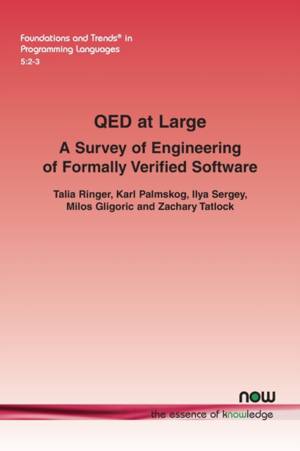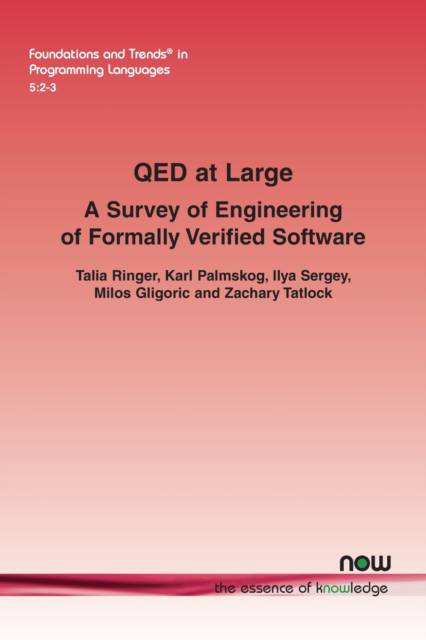
Door een staking bij bpost kan je online bestelling op dit moment iets langer onderweg zijn dan voorzien. Dringend iets nodig? Onze winkels ontvangen jou met open armen!
- Afhalen na 1 uur in een winkel met voorraad
- Gratis thuislevering in België vanaf € 30
- Ruim aanbod met 7 miljoen producten
Door een staking bij bpost kan je online bestelling op dit moment iets langer onderweg zijn dan voorzien. Dringend iets nodig? Onze winkels ontvangen jou met open armen!
- Afhalen na 1 uur in een winkel met voorraad
- Gratis thuislevering in België vanaf € 30
- Ruim aanbod met 7 miljoen producten
Zoeken
Qed at Large
A Survey of Engineering of Formally Verified Software
Talia Ringer, Karl Palmskog, Ilya Sergey, Milos Gligoric, Zachary Tatlock
€ 123,45
+ 246 punten
Omschrijving
Development of formal proofs of correctness of programs can increase actual and perceived reliability and facilitate better understanding of program specifications and their underlying assumptions. Tools supporting such development have been available for over 40 years but have only recently seen wide practical use. Projects based on construction of machine-checked formal proofs are now reaching an unprecedented scale, comparable to large software projects, which leads to new challenges in proof development and maintenance. Despite its increasing importance, the field of proof engineering is seldom considered in its own right; related theories, techniques, and tools span many fields and venues. QED at Large covers the timeline and research literature concerning proof development for program verification, including theories, languages, and tools. It emphasizes challenges and breakthroughs at each stage in history and highlights challenges that are currently present due to the increasing scale of proof developments. This monograph is intended for use by researchers and students who are new to the field. It provides the reader with an insightful overview of the work that has led to modern-day techniques for formally verifying software. In times of increasing automation, this underpins many software systems so future trends are also highlighted.
Specificaties
Betrokkenen
- Auteur(s):
- Uitgeverij:
Inhoud
- Aantal bladzijden:
- 194
- Taal:
- Engels
- Reeks:
- Reeksnummer:
- nr. 13
Eigenschappen
- Productcode (EAN):
- 9781680835946
- Verschijningsdatum:
- 3/09/2019
- Uitvoering:
- Paperback
- Formaat:
- Trade paperback (VS)
- Afmetingen:
- 156 mm x 234 mm
- Gewicht:
- 285 g

Alleen bij Standaard Boekhandel
+ 246 punten op je klantenkaart van Standaard Boekhandel
Beoordelingen
We publiceren alleen reviews die voldoen aan de voorwaarden voor reviews. Bekijk onze voorwaarden voor reviews.











